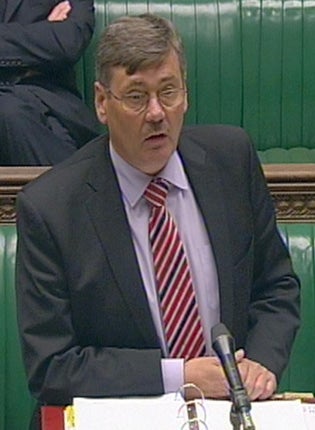Does minister for the armed forces have the firepower to defend them?

Your support helps us to tell the story
From reproductive rights to climate change to Big Tech, The Independent is on the ground when the story is developing. Whether it's investigating the financials of Elon Musk's pro-Trump PAC or producing our latest documentary, 'The A Word', which shines a light on the American women fighting for reproductive rights, we know how important it is to parse out the facts from the messaging.
At such a critical moment in US history, we need reporters on the ground. Your donation allows us to keep sending journalists to speak to both sides of the story.
The Independent is trusted by Americans across the entire political spectrum. And unlike many other quality news outlets, we choose not to lock Americans out of our reporting and analysis with paywalls. We believe quality journalism should be available to everyone, paid for by those who can afford it.
Your support makes all the difference.Bob Ainsworth, the Defence Secretary, rounded on his Tory critics yesterday, urging them not to play politics over the rising death toll among British troops in Afghanistan.
But questions are being asked at Westminster about whether Mr Ainsworth, a surprise promotion to become the political head of the Ministry of Defence (MoD) last month, is the right man for the job at a time when the conflict in Afghanistan has risen to the top of the political agenda.
Labour's former deputy chief whip was widely seen as one of Westminster's back-room operators but became Armed Forces minister, a middle-ranking post outside the Cabinet, in 2007. Labour colleagues thought he would go no higher up the political ladder. "He is a bit of a plodder – solid, loyal but dour and not a politician for the 24/7 media age," one said yesterday.
Gordon Brown's aides insisted that Mr Ainsworth was not an emergency appointment in a reshuffle brought forward after the resignation of James Purnell, the former work and pensions secretary. They insisted he was always the front-runner to succeed John Hutton, who left the Cabinet in the reshuffle. Aides claimed that Mr Ainsworth was popular with the service chiefs and that his promotion from armed services minister ensured "continuity" during the Afghanistan conflict and made more sense than putting a fresh face with no experience of defence into the post.
For Britain's service chiefs, Mr Ainsworth's promotion was a mixed blessing. For some, it was a case of "better the devil you know", even if they do not regard Mr Ainsworth as the sharpest mind round the cabinet table.
But there is some concern at Mr Ainsworth's relatively low position in the cabinet pecking order. He is 21st out of 23, whereas his predecessor Mr Hutton was 10th. Lord Owen, the former foreign secretary, said last night that this was "extraordinary", adding: "It does mean you are not giving that person the clout and the position in the Government which the office deserves. You would normally expect to see a defence secretary in the top half of the Cabinet."
There are fears his rank will weaken Mr Ainsworth's hand in negotiations with Downing Street and the Treasury over troop numbers and equipment in Afghanistan and bodes ill for the defence budget when the inevitable squeeze on public spending bites.
In the Commons yesterday, Mr Ainsworth promised to fight his corner in such battles. He played with a characteristic straight bat during an hour of hostile bowling as opposition MPs questioned Britain's strategy in Afghanistan.
The former sheet metal worker, who is MP for Coventry North East, urged his critics not to undermine British troops, who he had told on a recent visit they enjoyed cross-party support.
He said: "We all need to try to make the maximum contribution to maintaining the cross-party support that our operations in Afghanistan have enjoyed over the years, and we shouldn't allow any tensions that there may have been over the last few days to dent that."
Mr Brown's official spokesman dismissed the cabinet pecking order as a "media obsession", insisting Mr Ainsworth was a senior figure with "clout" who meets the Prime Minister regularly. But a Tory frontbencher said: "There is a lot of muttering in defence circles. The top brass at the MoD are fuming that their place has been downgraded. They are worried that the Treasury will always have the upper hand over him."
*A Populus poll for ITV's News at Ten shows that nearly three in five people (59 per cent), believe British troops should be withdrawn from Afghanistan, while only 36 per cent think they should stay; 75 per cent believe the troops are inadequately equipped.
Join our commenting forum
Join thought-provoking conversations, follow other Independent readers and see their replies
Comments